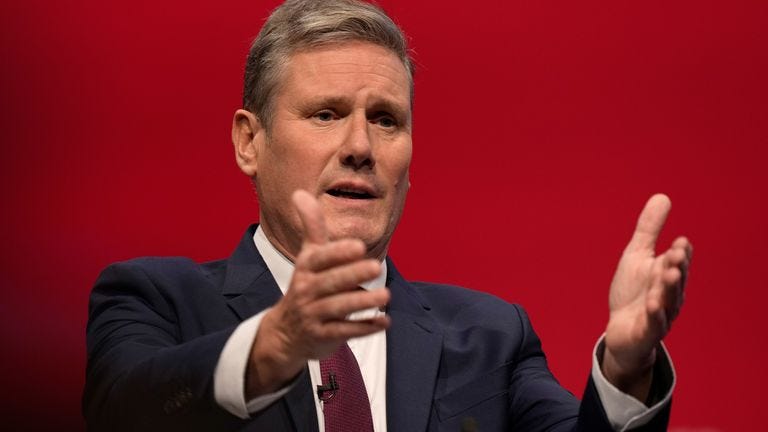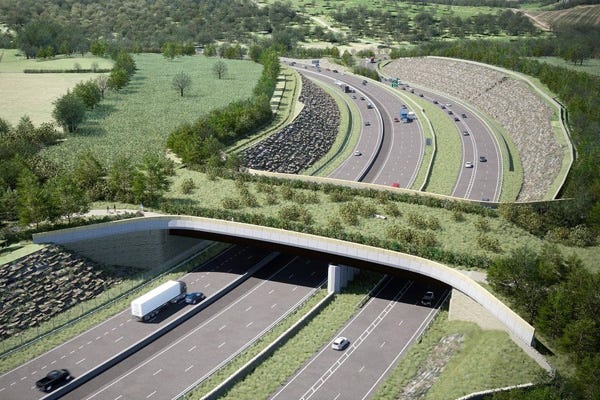The Labour government has announced a raft of measures designed to stimulate economic growth, something which has been sluggish (in the common parlance of economic journalism) for the past twenty years. In the third quarter of 2024, the UK’s gross domestic product (GDP) had only increased by 2.9% compared to the last quarter of 2019; by comparison the Eurozone’s GDP has recovered by 4.6% and the US’s by 11.5%. Among the measures proposed by the government are a dramatic relaxation of the planning laws, that is the regulations governing construction. This will encourage, among others, the housebuilding industry to build bigger developments more quickly, and with fewer regulatory ‘barriers’ in their way, so the government say. For reasons best known to themselves, environmental protections around the natural world seem to be firmly in the crosshairs of an increasingly desperate administration.
Britain is a country exceptionally lacking in biodiversity. The 2023 State of Nature Report, a periodic assessment of the UK’s biodiversity, identified that since 1970 an average 19% decline in the abundance of the almost 800 species traced by the survey; 290 (38%) showed strong or moderate decreases whilst 205 (27%) showed strong or moderate increases. Several hundred years of destructive agricultural management, fossil fuel extraction, and other environmentally damaging activities has resulted in a countryside which is nice to look at but uncannily silent (something which anyone who has been walking in Derbyshire or the Lakes will tell you). For example, the massive growth in sheep farming in the eighteenth century resulted in the wholesale deforestation of the uplands of northern England; the vast moors which are now synonymous with the region are a relatively recent manmade creation and a sign of ecological vandalism. Since it is in the English land market that the hungry exploitation of capitalist economics began, this is not something which should surprise us (by which I mean, me and you, and others, anyone who’s interested really). Projects are underway to repair some of the damage done by hundreds of years of neglect and destruction, such as the work of charity Rewilding Britain.
The Labour government came to power promising that they would do nothing, but competently, an empty neoliberal logic which has not paid dividends now they have entered government. After spending the first six months in government telling people how miserable everything is and how they will be incapable of solving Britain’s many problems, they have realised they should probably do something about anything. Their already anaemic poll ratings have recently taking a dramatic cliff dive. In January, the most recent Times/YouGov poll awarded Labour just 26% of the vote, with Reform UK coming second on 25% and the Tories on 22%. While of course these are figures taken well in advance of any future election, when they are compared to the popular vote figures from the July election results where Labour garnered 34%, Reform 14% and the Tories 24%, one gets a sense of the direction of travel and the underlying shallowness of Labour’s victory. Any measure therefore which can be shown to be prioritising economic growth and that the government is attempting to deliver on whatever it thinks its objectives are is being fanatically boosted by Downing Street.

One of the endangered species in the firing line for Labour’s developers are, weirdly enough, bats. This has been part of a truly absurd rhetorical shift by the government, which seems to simultaneously make major concessions to the Tory way of running the world (i.e. economic growth is essentially held back by excessive regulation) and ridiculing and belittling anyone who seems to think continuing to have a natural world devoid of concrete would be a good thing. As Mic Wright recently wrote on Conquest of the Useless:
The aim is to sound sharp and decisive, but that ends up completely removing nuance from the discussion. Business good, environmental concerns bad. Starmer is apeing the language of the right-wing columnist for whom regulators are the worst kind of monsters. It’s a black-and-white world where the only kind of legal challenges are vexatious ones and consultations can only be unacceptable roadblocks.
This simplistic binary between economic growth and the defence of nature is no clearer than in the government’s planning reforms, which the government will introduce to Parliament in a planning bill in the next few weeks. In a statement trailing certain aspects of the reforms, Keir Starmer said that he would simplify the judicial review process, thereby limiting the number of opportunities campaigners had to challenge developments, and establish a Nature Restoration Fund, saying of the latter:
The new common-sense approach doesn’t allow newts or bats to be more important than the homes hardworking people need, or the roads and hospital (sic) this country needs.
The Nature Restoration Fund has attracted the special concern of environmental groups. Developers are currently legally obligated to put an environmental mitigation strategy in place prior to breaking ground. Labour’s plans will allow developers to simply pay into the Fund which will then be distributed to other organisations for mitigation, such as Natural England. Crucially, mitigation of environmental impact will not have to take place at site and site surveys intended to measure environmental impact will not need to be carried out. In other words, the specific environmental impact at the development site will be mitigated in general elsewhere in the country by projects supported by Natural England. Environmental groups have pointed out that this seems to make neither logical nor policy sense. The Bat Conservation Trust has said:
Changes could allow developers to pay into the newly proposed Nature Restoration Fund to break the law and avoid taking necessary steps to protect species and habitats on the sites they are working on. Furthermore, the proposals would disincentivise developers from engaging proactively with nature recovery.
The plan has also been criticised by the Institute of Environment and Management Assessment (IEMA), a professional body which represents environmental assessors. Their policy chief Ben Goodwin has said:
Principally the government is saying pay into this pot for wider strategic enhancement of the natural environment and you can crack on and build.
This is the opposite of the ‘mitigation hierarchy’. Effectively saying compensate for environmental damage as the first step, instead of avoiding environmental damage, and runs contrary to good practice and established principles of environmental protection.
The government has also sought to ridicule and delegitimise attempts at environmental mitigation. Starmer and Rachel Reeves have repeatedly referred to a £100m ‘bat tunnel’ in Buckinghamshire designed to protect a population of Bechstein’s bats in the adjacent Sheephouse Wood, an ancient woodland which is home to several other bat species and wildlife. This story has been routinely misrepresented by the government and in the mainstream press as an absurd piece of expenditure. Jon Thompson, executive chair of HS2 Ltd since October 2023, complained to an industry conference about the rising cost of the structure, and in the same speech claimed that Bechstein’s bat was not endangered in the UK (it is), and that there was ‘No evidence…that high-speed trains interfere with bats’ (there is). Natural England, the UK’s environmental regulator, has said that it:
has not required HS2 to adopt this structure, nor advised on the design or cost. Our input has been to comment on whether the proposed mitigations will work.
The statement continued that the need to build a structure protecting the woodland was identified over ten years ago in an environmental survey conducted in 2013. Both Natural England (implicitly) and the Bat Conservation Trust have suggested that it is a failure on HS2 Ltd’s part that decisions about how to fulfil this need and protect the wildlife resident in Sheephouse Wood were taken far later than they should have been, thus necessitating the consideration of blunter solutions which tend to be more expensive. The Bat Conservation Trust has, for example, suggested that a green bridge which would allow people and wildlife to safely cross the rail line would have been a cheaper, more sustainable, and more effective alternative.
Therefore, whilst an illogical and labyrinthine regulatory regime may well not have helped HS2 Ltd, it is not the existence of the regulations themselves nor the legally binding obligation to protect rare or endangered bat populations which has led to this structure being the solution to a long-identified environmental need. Furthermore, if I was Jon Thompson, and I was presiding over a project with an estimated £10-20bn overspend, I would also want dysfunction and incompetence within my own organisation, or the extremely complex supply chains associated with excessive outsourcing, not to be the reason that the UK had failed to build a not particularly complicated railway line. That’s right, Jon, it’s the bats’ fault.
These measures are at worst the sign of a majoritarian form of democracy which ridicules and belittles minority interests and concerns, including views which are unpopular or not in keeping with the government’s model of the world. Bats aren’t doing anything wrong by existing, and people who want to protect habitats aren’t conspiring against people who want to live in new-build houses or who want to drive down roads. In fact, perhaps some of those people who care about bat habitats themselves live in new-build houses and drive down roads. The Prime Minister can bleat and moan as much as he likes about how people care about bats and how they refuse to think he’s the best leader Britain has had ever. The truth is that for whatever else the Labour government might want to prioritise, their first six months have been characterised by total political incompetence. For the first few months, they were worried that people might be disappointed that they might over-promise, and so promised nothing and seemed determined to impress on the electorate how miserable and irreconcilably horrible Britain was. Now, they’ve decided that environmental and financial regulations are just talking Britain down and need to be swept away so their growth agenda can flourish, and that they also need to have needlessly combative and adversarial fights with environmental groups and their own MPs. This radical about-face alienates Labour’s base and rings hollow to the right-wing press and investors Labour seem desperate to attract to the UK. George Monbiot writing in Guardian said ‘I suspect these are intelligent people posing as morons for political purposes’. Your writer is not so sure. They might actually be morons.
Thanks for reading! Please share and subscribe; as ever, any tips to contactmrabney@gmail.com.



